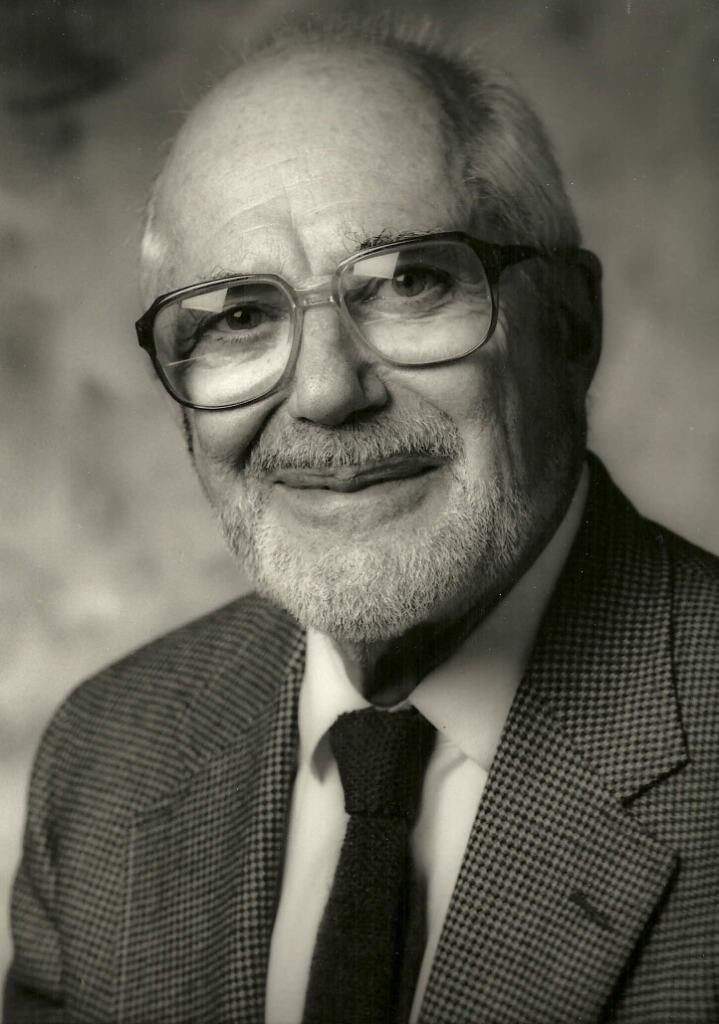

|

|
IN MEMORIAM
Albert Kaspin
Professor of Slavic Languages and Literatures, Emeritus
UC Santa Barbara
1914 – 2009
Albert Kaspin's life was closely linked to the University of California. Born in St. Louis, Missouri, on September 29, 1914, he came of age at the start of the Great Depression. The lure of California and opportunity drew the family to Los Angeles in the early 1920s. Albert was educated in public schools, graduating from the Roosevelt High School in East Los Angeles in 1931 and from a Junior College in 1934. An idealistic young man, he traveled to the Soviet Union to learn firsthand how the future world was being built under communism. In 1934-1936, like many other American enthusiasts, he worked, as electrician and truck driver, on the construction of the Moscow Metro—one of the exemplary projects of the early Soviet era. For this opportunity, he had unwittingly agreed to take Soviet citizenship. By 1939 he was ready to come home, but discovered that under Stalin's rule leaving Soviet Russia would not be easy. When he applied for permission to leave, it was denied; he lost his job. For several years he made a living in Moscow as a librarian, teacher, and tutor of English. After 1941, when the Soviet Union entered World War II and became an ally of the U.S., he worked for American organizations. In 1941 he was an interpreter for the American Delegation at the Three Power Conference in Moscow (which discussed the distribution of Lend-Lease supplies provided by the US and UK to nations fighting Germany) in 1942, translator for the U.S. Military Attaché to the USSR, and in 1942-1946, translator-secretary for the American Red Cross Mission to the USSR. In 1946 he was finally able to return to the USA.
From Russia Albert Kaspin brought a love for Russian literature. He became a student at Berkeley, earning degrees in Slavic Languages and Literatures: BA in 1949, MA in 1952, and PhD in 1957. He also taught Russian at Berkeley. At Berkeley, he met Ruth McGovney, his future wife, who was teaching French. Her father, Dudley O. McGovney, had been professor of constitutional law at Boalt Hall School of Law for some twenty years. When Albert Kaspin completed his PhD and started looking for jobs in the Russian field, it was the McCarthy era: the hazardous years he had spent in Soviet Russia now worked against him. It was not until 1962 that his US citizenship was reinstated. But the advent of Sputnik enhanced the popularity of Russian studies, and he did find teaching jobs, at the University of Tennessee, the University of Wisconsin at Madison, Vanderbilt University, and the University of Illinois at Urbana-Champaign. Throughout these years, he came back to Berkeley to teach in the summer school. In 1965 he was hired with tenure at the Santa Barbara campus of the University of California, where he built the Russian program. He nurtured his students, and decades later they recalled and reflected upon his impact on their lives with warmth and gratitude. Professor Kaspin retired from UC Santa Barbara in 1981. In recognition of his inspirational teaching, he received the UCSB Alumni Association Teaching award in 1992.
Albert Kaspin's publications on Alexander Ostrovsky are among the very few scholarly works on the major nineteenth-century Russian dramatist available in English. In his studies, he reexamined Ostrovsky's unconventional characters, the “superfluous men,” the “underground men,” the social upstarts. His translation of Boris Eikhenbaum's Tolstoy in the Seventies (Ann Arbor: Ardis, 1982) brought a classic work of Russian literary scholarship to the American reader, and it has been widely used in teaching. A book of memoirs he published with colleagues at Santa Barbara, Eyewitness: Selections from Russian Memoirs, edited by D. Barton Johnson, Albert Kaspin and Mstislav W. Kostruba (New York: Harcourt Brace Jovanovich, 1971), documents and preserves important personal memories of Russian historical experience.
Albert Kaspin died on January 10, 2009. His wife of more than fifty years, Ruth McGovney Kaspin, died on March 15, 2002. They have honored the University of California by endowing a fund that provides scholarships, through the UC Berkeley Incentive Awards Program, to low-income students from Los Angeles, with preference given to graduates of Albert Kaspin's Alma Mater, the Roosevelt High School. They have also established the Albert and Ruth McGovney Kaspin Chair in Slavic Languages and Literatures at the Berkeley campus--a fund for new opportunities in research, teaching, and cultural awareness. Albert and Ruth McGovney Kaspin devoted their lives to teaching languages and literature to university students, and their lifetimes’ work has left many traces. They are warmly remembered by their family members, students, colleagues, and readers.
Joan Grossman, D. Barton Johnson, Irina Paperno